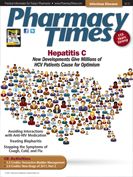Publication
Article
Pharmacy Times
Allergy Watch
Study Finds Hay Fever Worse in Late Spring than Early Summer
Regardless of grass pollen levels, hay fever symptoms are worse in the early part of the flowering season (late spring) than in the late part of the flowering season (early summer), according to research published in the December 2011 issue of Clinical and Translational Allergy.
The study enrolled 84 participants aged 18 to 60 years from areas around the city of Leiden in the Netherlands. Researchers compared daily pollen counts with daily symptoms of seasonal allergic rhinitis, including runny nose, sneezing, blocked nose, postnasal drip, and eye symptoms, through self-reported data from May to July 2007 and from April to July 2008.
The study showed that the symptom scores at the beginning of the flowering season were higher than the scores at the end of the flowering season, even when pollen counts in the air were the same. Other variables, including allergies to birch pollen, house dust mites, dogs, and cats, could not explain the differences between symptom scores. Researchers concluded that use of medications by the participants, such as antihistamines and nasal steroids, could not explain the perceived symptom alleviation the participants reported in the summer.
Letty de Weger, MD, lead researcher of the study, hypothesized that allergy sufferers may perceive late-season symptoms as milder because they grow accustomed to them, or that pollen later in the season is actually less allergenic. Dr. Weger also referenced other research that showed that “high exposure to grass pollen early in the season may down regulate inflammation on subsequent contact possibly via the production of allergen specific regulatory T cells.”
Adult First-Time Cat Owners More Likely to Develop an Allergy
Acquiring a cat as an adult can double the risk of developing a cat-related allergy, according to a new study.
In the study, lead author Mario Olivieri, MD, of the University of Verona, Italy, and colleagues analyzed data on nearly 6300 adults aged 20 to 44 years who were not allergic to cats at study onset. Their responses on the European Community Respiratory Health Survey (ECRHS I) were compared with their responses to the same survey (ECRHS II) 9 years later. Of these participants, 4468 subjects did not have a cat at any point in the study, 473 had a cat only at the beginning of the study, 651 acquired a cat during the follow-up, and 700 had a cat at both evaluations.
Results suggested that cat acquisition during follow-up was significantly associated with new-onset cat sensitization, with this group almost twice as likely (relative risk = 1.85) to develop an allergy to cats.
The authors found that a group of 89 people—made up of those who had a cat before the study and those who got a cat after the first arm of the study—did not develop cat sensitization at all. In addition, only those participants who let their cat into their bedroom developed an allergy. Additionally, individuals with preexisting sensitization to other allergens, nasal allergies, or asthma were between 3 and 4 times more likely to develop cat sensitivity. Owning a cat in childhood appeared to be a protective factor.
AAP Recommends New Allergy Testing Guidelines
In December 2011, the American Academy of Pediatrics (AAP) released a clinical report with recommendations for the appropriate use of allergy testing in children.
According to the AAP, allergy testing can often result in false positives or negatives when testing sensitization of specific triggers in children. Although allergenspecific IgE tests and skin prick tests can help confirm allergic triggers, patients should not be diagnosed as allergic to something based solely on these tests.
Recommendations from the report, published in the January 2012 issue of Pediatrics, are as follows:
• Allergy tests should be used to confirm suspected allergies after the appearance of symptoms, not as diagnostic tests for potential triggers in symptomfree children
• Testing may help determine if a vaccine suspected of triggering a reaction was in fact the cause
• Use of multi-allergen serum tests are helpful for screening for disease when there is clinical suspicion, and are preferred to large panels of indiscriminately performed screening tests
• Drug allergy testing is not recommended, as these tests are not standardized
• Food allergies should be tested over time with periodic allergy tests; if results are negative but there is clinical suspicion of an allergy, a medically supervised oral food challenge may be necessary
• Allergy testing should be considered when symptoms of anaphylaxis occur after an insect bite.
The authors of the report wrote, “Testing large panels of allergens without consideration of the history, geographic relevance, and disease characteristics may result in many clinically irrelevant positive results, which, if overinterpreted, may lead to costly and socially, emotionally, and/or nutritionally detrimental actions of unnecessary allergen avoidance.”







